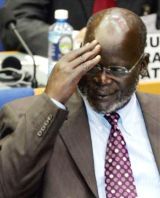Sudan rebel leader confident of peace deadline
By Gershwin Wanneburg
PRETORIA, Dec 3 (Reuters) – Sudan’s southern rebel leader John Garang said on Friday he was confident of reaching a peace deal with the Khartoum government by an agreed Dec. 31 deadline despite some outstanding issues.

|
|
Sudan People’s Liberation Movement leader John Garang salutes Sudanese Vice President Ali Osman Taha, Friday, Nov. 19, 2004 during the U.N Security Council meeting in Nairobi, Kenya. (AP). |
“We will be concluding and signing the final peace agreement no later than the 31st December of this year,” Garang, who heads the Sudan People’s Liberation Movement (SPLM), told reporters in South Africa where he was briefing officials.
Garang is due to meet Sudanese First Vice President Ali Osman Taha in the Kenyan town of Naivasha on Sunday for the next round of talks.
The SPLM and Khartoum pledged before the U.N. Security Council last month to end the 21-year-old war by Dec. 31. The conflict, Africa’s longest running civil war, has killed some two million people in a struggle complicated by issues of oil, ethnicity and ideology.
The Islamist Sudanese government and the mainly animist or Christian SPLM based in the oil-rich south have made substantial progress towards a peace deal, but dates for a final agreement have repeatedly slipped since 2003.
Sudan faces conflict on many fronts – mainly in the south where rebels have been fighting the government since 1983 when Khartoum tried to impose Islamic law on the entire country.
But violence has also erupted in the western Darfur region, triggering what the United Nations calls the world’s worst humanitarian crisis. The U.N. Security Council has promised political and economic support once Sudan ends its southern war and the Darfur conflict.
Garang said progress toward peace in southern Sudan would provide a framework for peace across the country, echoing hopes expressed by U.N. officials.
“We believe, the international community believes, that the solution to Darfur really is through Naivasha, that the Naivasha process is not just about north and south,” Garang said. “It’s a comprehensive agreement that talks about the peaceful, democratic transformation of the country, sharing of wealth, sharing of power.”
There are nevertheless outstanding issues to be agreed, including funding for SPLM forces not integrated into the national army and how the government will administer payments of lucrative oil revenues to the south.
Garang said it was possible that the SPLM’s armed forces would remain outside the national army for years to come while the two sides simultaneously draw down forces.
“The two armies will maintain separate entities for six years… We will form what we have called ‘joint integrated units’. The ‘joint integrated units’ will have contributions from the two armed forces,” Garang said.
He added that both sides would contribute 12,000 forces in the south and a further 8,000 each in the north, while still retaining their central armies.
He declined to discuss the oil payments, calling it simply as an “artificial problem” that would not derail the talks.
